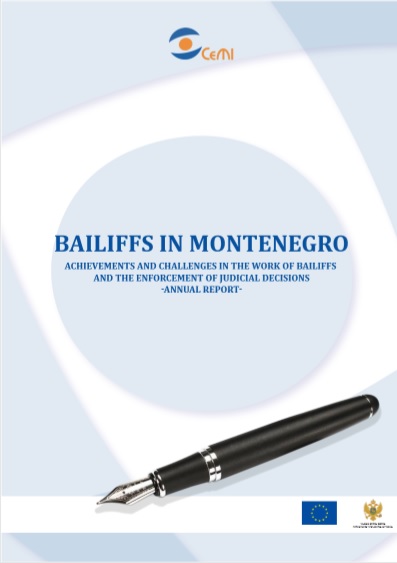This thematic Report was created as part of the project “Judicial Reform: Upgrading CSO’s capacities to contribute to the integrity of judiciary”, which is implemented by Centre for Monitoring and Research (CeMI), in collaboration with Centre for Democracy and Human Rights (CEDEM) and Network for the Affirmation of European Integration Processes (MAEIP), and funded by the European Union and co-financed by the Ministry of Public Administration of Montenegro.
The aim of the Report is to draw conclusions and recommendations for improvement, by analysing effects of the judicial decisions enforcement system and the functioning of the bailiff system in the previous two years.
An important component of the judicial reform process of Montenegro in the previous period concerned harmonization of the judicial decisions enforcement process with the standards and practices of the most developed countries in Europe. The adoption of the first set of laws in this field in 2011, resulted in establishing the basis for bailiff profession and judicial decisions enforcement system in Montenegro. The legal framework governing the main issues related to the judicial decisions enforcement system in Montenegro is largely aligned with international standards in this field, but similar to many other areas of judicial reform, the effects of its implementation so far can be questioned, especially regarding the institutional structure, compliance with the law and accountability within the profession.
Bailiff profession, as one of the youngest in the judicial system of Montenegro, has undergone an extremely turbulent period of professional development in the past few years. Doubts of legality, problematic relationship with clients and controversies regarding the enormous earnings that bailiffs have generated while providing a public service, are just some issues which have posed a serious challenge for both this profession, and also for the institutions responsible for overseeing the functioning of the bailiff system. On the other hand, the available information on the number of ongoing cases confirms the justification to introduce the judicial decisions enforcement system, which can be seen as effective in terms of the results achieved in the previous five years. However, citizens still do not show a high degree of confidence in the work of bailiffs, and special attention should be paid to this in the coming period.
This Report summarizes the information obtained by analysing reports made by competent authorities, and the results of public opinion polls, as well as by conducting interviews with bailiffs, representatives of competent state bodies and institutions, judges and other actors in the judicial decisions enforcement system. The Report consists of an introduction and three thematic sections. The first thematic section presents legal and institutional framework governing the system of judicial decisions enforcement in Montenegro; the second thematic section outlines observations of bailiffs’ work efficiency, while the third thematic section is devoted to presenting the results of the research about the bailiffs’ accountability system. In all parts of the Report, the emphasis was placed on observations and identified shortcomings in the work of bailiffs, as well as in the overall functioning of the enforcement system in Montenegro. A summary of the recommendations is provided at the end of the Report, and it will be presented by CeMI to all major stakeholders in the judicial reform process, in the coming period.
Finally, it should be noted that while preparing this Report, CeMI’s legal team had cooperated with all institutions involved in the judicial decisions enforcement system. In particular, we would like to emphasize the willingness of the Chamber of Bailiffs to contribute to the quality of research, through an open and proactive relationship, by providing researchers with all the necessary information in a transparent and responsable manner.
